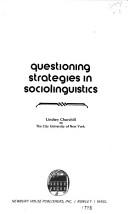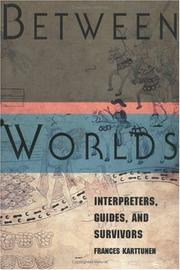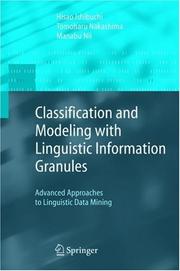| Listing 11 - 16 of 16 | << page >> |
Sort by
|

ISBN: 0883771179 9780883771174 Year: 1978 Publisher: Rowley, Mass.: Newbury house,
Abstract | Keywords | Export | Availability | Bookmark
 Loading...
Loading...Choose an application
- Reference Manager
- EndNote
- RefWorks (Direct export to RefWorks)
Sociolinguistics --- Linguistic informants --- Interviewing in sociolinguistics --- Methodology --- -Language and languages --- Language and languages --- Language and society --- Society and language --- Sociology of language --- Language and culture --- Linguistics --- Sociology --- Integrational linguistics (Oxford school) --- Informants, Linguistic --- Native speakers as linguistic informants --- Social aspects --- Sociological aspects --- -Methodology --- -Informants, Linguistic --- Sociolinguistics - Methodology

ISBN: 0813555264 0585071195 9780585071190 0813520304 0813520312 9780813520308 9780813520315 Year: 1994 Publisher: New Brunswick, N.J. Rutgers University Press
Abstract | Keywords | Export | Availability | Bookmark
 Loading...
Loading...Choose an application
- Reference Manager
- EndNote
- RefWorks (Direct export to RefWorks)
Spanning the globe and the centuries, Frances Karttunen tells the stories of sixteen men and women who served as interpreters and guides to conquerors, missionaries, explorers, soldiers, and anthropologists. These interpreters acted as uncomfortable bridges between two worlds; their own marginality, the fact that they belonged to neither world, underscores the complexity and tension between cultures meeting for the first time. The interpreters include:o Do-a Marina (La Malinche), who interpreted for Cortes in the conquest of Mexicoo Sacajawea, who accompanied Lewis and Clark on their expeditiono Sarah Winnemucca, a U.S. army scout and Washington lobbyist for the Northern Paiuteso Gaspar Antonio Chi, Maya Interpreter General for Yucatano Guaman Poma de Ayala, eyewitness reporter of the destruction of Inca cultureo Charles Eastman, a Sioux physician at Wounded Kneeo Larin Paraske, an informant for Finnish ethnographerso Do-a Luz Jimenez, Diego Rivera's model and a native informant to anthropologistso Mar'a Sabina, the Mazatec mushroom shaman who became a celebrity in the drug culture of the 1960so Ishi, the last surviving Yahi Indian.
Translators --- Linguistic informants --- Intercultural communication. --- Biography. --- Cross-cultural communication --- Communication --- Culture --- Cross-cultural orientation --- Cultural competence --- Multilingual communication --- Technical assistance --- Informants, Linguistic --- Native speakers as linguistic informants --- Linguistics --- Interpreters --- Linguists --- Translating services --- Anthropological aspects --- Methodology --- TRANSLATORS --- INTERCULTURAL COMMUNICATION --- LANGUAGE ARTS & DISCIPLINES --- Language And Languages --- Language Arts & Disciplines --- Intercultural communication --- Language arts & disciplines
Book
ISBN: 1847698719 1847698700 9781847698704 9781847698698 1847698697 9781847698681 1847698689 Year: 2013 Publisher: Channel View Publications
Abstract | Keywords | Export | Availability | Bookmark
 Loading...
Loading...Choose an application
- Reference Manager
- EndNote
- RefWorks (Direct export to RefWorks)
The relative status of native and non-native speaker language teachers within educational institutions has long been an issue worldwide but until recently, the voices of teachers articulating their own concerns have been rare. Existing work has tended to focus upon the position of non-native teachers and their struggle against unfavourable comparisons with their native-speaker counterparts. However, more recently, native-speaker language teachers have also been placed in the academic spotlight as interest grows in language-based forms of prejudice such as ‘native-speakerism’ – a dominant ideology prevalent within the Japanese context of English language education. This innovative volume explores wide-ranging issues related to native-speakerism as it manifests itself in the Japanese and Italian educational contexts to show how native-speaker teachers can also be the targets of multifarious forms of prejudice and discrimination in the workplace.
Linguistic informants --- Language and languages --- Second language acquisition. --- Linguistics --- Linguistic science --- Science of language --- Second language learning --- Language acquisition --- Foreign languages --- Languages --- Anthropology --- Communication --- Ethnology --- Information theory --- Meaning (Psychology) --- Philology --- Informants, Linguistic --- Native speakers as linguistic informants --- Study and teaching --- Methodology --- Japan --- Languages.

ISBN: 0813520312 0813520304 Year: 1994 Publisher: New Brunswick, N.J. Rutgers University Press
Abstract | Keywords | Export | Availability | Bookmark
 Loading...
Loading...Choose an application
- Reference Manager
- EndNote
- RefWorks (Direct export to RefWorks)
#KVHA:Vertalers; biografieen --- #KVHA:Tolken; biografieen --- 82.033 --- Literatuur. Algemene literatuurwetenschap. Tolken --- tolken --- Interpreting --- Translation science --- Sociolinguistics --- Linguïstische informanten --- Vertalen en interculturele communicatie. --- Vertalers en tolken --- Biografieën. --- Translators --- Linguistic informants --- Intercultural communication --- Traducteurs --- Informateurs (Linguistique) --- Communication interculturelle --- Biography --- Biographies --- Interpreters --- Linguists --- Translating services --- Informants, Linguistic --- Native speakers as linguistic informants --- Linguistics --- Cross-cultural communication --- Communication --- Culture --- Cross-cultural orientation --- Cultural competence --- Multilingual communication --- Technical assistance --- Methodology --- Anthropological aspects
Book
ISBN: 9811071624 9811071608 Year: 2018 Publisher: Singapore : Springer Singapore : Imprint: Springer,
Abstract | Keywords | Export | Availability | Bookmark
 Loading...
Loading...Choose an application
- Reference Manager
- EndNote
- RefWorks (Direct export to RefWorks)
This book probes for a post-native-speakerist future. It explores the nature of (English and Japanese) native-speakerism in the Japanese context, and possible grounds on which language teachers could be employed if native-speakerism is rejected (i.e., what are the language teachers of the future expected to do, and be, in practice?). It reveals the problems presented by the native-speaker model in foreign language education by exploring individual teacher-researcher narratives related to workplace experience and language-based inclusion/exclusion, as well as Japanese native-speakerism in the teaching of Japanese as a foreign language. It then seeks solutions to the problems by examining the concept of post-native-speakerism in relation to multilingual perspectives and globalisation generally, with a specific focus on education.
Education. --- Applied linguistics. --- Language and education. --- Language Education. --- Applied Linguistics. --- Educational linguistics --- Children --- Education, Primitive --- Education of children --- Human resource development --- Instruction --- Pedagogy --- Schooling --- Students --- Youth --- Education --- Linguistic informants. --- Native language. --- Language and languages --- Study and teaching. --- Foreign language study --- Language and education --- Language schools --- Mother tongue --- Vernacular language --- Informants, Linguistic --- Native speakers as linguistic informants --- Linguistics --- Methodology --- Language and languages. --- Foreign languages --- Languages --- Anthropology --- Communication --- Ethnology --- Information theory --- Meaning (Psychology) --- Philology

ISBN: 1280462515 9786610462513 3540268758 3540207678 3642058604 Year: 2005 Publisher: New York : Springer,
Abstract | Keywords | Export | Availability | Bookmark
 Loading...
Loading...Choose an application
- Reference Manager
- EndNote
- RefWorks (Direct export to RefWorks)
Many approaches have already been proposed for classification and modeling in the literature. These approaches are usually based on mathematical mod els. Computer systems can easily handle mathematical models even when they are complicated and nonlinear (e.g., neural networks). On the other hand, it is not always easy for human users to intuitively understand mathe matical models even when they are simple and linear. This is because human information processing is based mainly on linguistic knowledge while com puter systems are designed to handle symbolic and numerical information. A large part of our daily communication is based on words. We learn from various media such as books, newspapers, magazines, TV, and the Inter net through words. We also communicate with others through words. While words play a central role in human information processing, linguistic models are not often used in the fields of classification and modeling. If there is no goal other than the maximization of accuracy in classification and model ing, mathematical models may always be preferred to linguistic models. On the other hand, linguistic models may be chosen if emphasis is placed on interpretability.
Language and languages --- Linguistic analysis (Linguistics) --- Linguistic informants. --- Linguistic models. --- Computational linguistics. --- Automatic language processing --- Language data processing --- Linguistics --- Natural language processing (Linguistics) --- Applied linguistics --- Cross-language information retrieval --- Mathematical linguistics --- Multilingual computing --- Data processing --- Models, Linguistic --- Typology (Linguistics) --- Informants, Linguistic --- Native speakers as linguistic informants --- Analysis, Linguistic (Linguistics) --- Analysis (Philosophy) --- Grammar, Comparative and general --- Methodology --- Information Technology --- Artificial Intelligence --- Artificial intelligence. --- Computer science. --- Computational Linguistics. --- Artificial Intelligence. --- Models and Principles. --- AI (Artificial intelligence) --- Artificial thinking --- Electronic brains --- Intellectronics --- Intelligence, Artificial --- Intelligent machines --- Machine intelligence --- Thinking, Artificial --- Bionics --- Cognitive science --- Digital computer simulation --- Electronic data processing --- Logic machines --- Machine theory --- Self-organizing systems --- Simulation methods --- Fifth generation computers --- Neural computers --- Informatics --- Science --- Computers. --- Automatic computers --- Automatic data processors --- Computer hardware --- Computing machines (Computers) --- Electronic calculating-machines --- Electronic computers --- Hardware, Computer --- Computer systems --- Cybernetics --- Calculators --- Cyberspace
| Listing 11 - 16 of 16 | << page >> |
Sort by
|

 Search
Search Feedback
Feedback About UniCat
About UniCat  Help
Help News
News